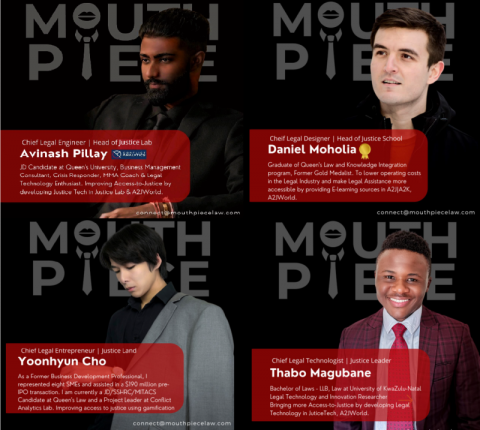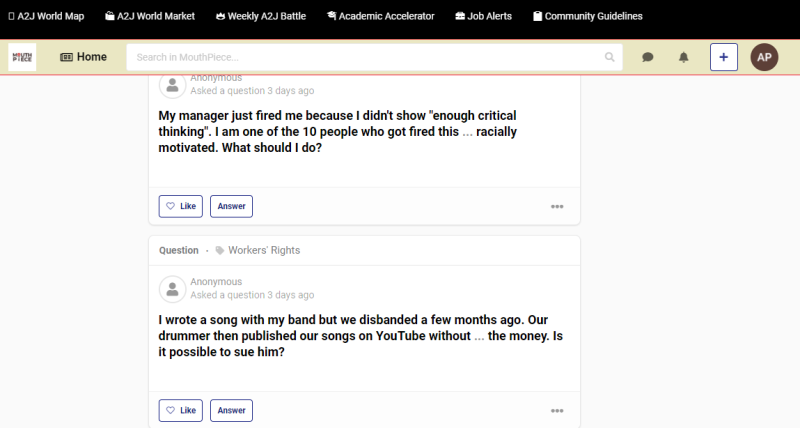

The global pandemic has accelerated digital transformation in all sectors, and the legal profession is certainly no exception. Similar to the exponential increase seen in telemedicine, virtual mental health resources, and online wealth management advisors, the delivery of legal services is changing in almost real-time. The result has been a fast-tracked transition from legacy delivery models to more agile, collaborative, and data-driven methods that are leveraging the latest in machine learning. Helping to prepare for this shift is the student team that developed Mouthpiece Law.
“We want both clients and practitioners to be happy, with practitioners earning more revenue through digitization and clients having access to cheaper products by way of a reduction in overhead costs in those who provide such products,” says Avinash Pillay, Law’22, Mouthpiece Law’s COO & Chief Legal Engineer.
Pillay and his core teammates – Yoonhyun Cho, Law’22 (CEO & Chief Legal Entrepreneur); Daniel Moholia, Law’21 (CIO); and Thabo Magubane of the University of KwaZulu-Natal’s Pietermaritzburg Law School (CTO) – are re-imagining the future of legal systems. With Mouthpiece Law, they aim to reduce traditional overhead costs for legal practitioners by as much as 50 per cent, as well as create cost-effective solutions for the general public to access legal services, and ultimately expand access to justice for traditionally marginalized communities.

Mouthpiece Law took the (digital) stage at Collision 2021 to present their platform to investors, firms, and other businesses.
In late-April, the team took the (digital) stage to pitch their innovative digital platform at Collision 2021. One the world’s largest technology conferences, Collision brings together global change makers from e-commerce, social media, and software companies, as well as NGOs, start-ups, FinTech providers, investors, celebrities, and more. Over 38,000 people participated (albeit remotely) in this year’s conference.
Mouthpiece Law’s road to Collision started when Cho and Pillay first began working together as project leads with the Conflict Analytics Lab at Queen’s. They were accepted into the Legal Innovation Zone’s Concept Framework Incubation program that helps support, foster, and develop solutions and techniques to improve legal services and the justice system and is modeled after Ryerson’s DMZ program to serve as a legal tech incubator. This built critical momentum for Mouthpiece Law and secured the team a spot at the Collision conference.
Pillay was featured as part of a pre-recorded pitch presentation that was broadcast to thousands of attendees and leading investors in the tech space. The team at Mouthpiece Law, he says, is “currently working with a group of angel investors, as well as with venture capitalists (VCs) who we connected with during Collision and have shown a tremendous interest in what we are offering. The legal technology market is growing rapidly as lawyers begin to realize the cost inefficiencies of antiquated billing and case management software. AI is becoming a buzz word in the law, and VCs seem to be increasingly driven to find ethical and ethnically diverse start-ups.”
There have been several early-adopters of Mouthpiece Law’s e-resume technology, such as Tessa Manuello, the Founder and CEO of Legal Creatives
As part of the Mouthpiece Law’s suite of innovative solutions, the team is also developing MyLawyerProfile. Dubbed a “metaverse,” this virtual networking platform is designed for lawyers and law students and serves as what Pillay calls “a digital passport for the legal services network.” In addition to providing a digital hub for lawyers to host their resumes, reference case work, list billable rates, promote thought leadership, and highlight areas of expertise, the team is also incorporating gamified engagement elements inspired by blockchain technology to advance professional development and attract an entirely new segment of clients.

MyLawyerly is one of Mouthpiece Law’s products that will offer agile QA services to the public using Ontario’s pre-existing pro bono framework.
“We are incorporating Non-Fungible Token (NFT) elements to increase engagement and provide a sense of satisfaction to our users,” says Cho. “Our users can earn unique badges based on their work on our platforms, such as rare badges that are limited quantity and serial-number-based to enhance the resume and job prospects of practitioners and law students. The platform will host weekly ‘A2J Battles’ that ask contentious legal questions. Winners will receive points, as well as limited-edition badges specific to the weekly challenge. Our goal is to keep legal professionals engaged through the social psychology underlying gamification, thereby reducing fatigue, burnout, and complacency.”
The team is also looking to secure eligibility for Regulatory Sandbox for Innovative Technological Legal Services, a five-year pilot project in which approved participants will receive permission from the Law Society of Ontario (LSO) to serve consumers through innovative technological legal services (ITLS) while complying with requirements for risk-based monitoring and reporting.
The LSO is looking to start-ups like Mouthpiece Law to help inform the future of regulatory development. According to the LSO, “the pilot project will provide evidence to inform longer term decision-making about ITLS regulation, and help potentially adjust rules, by-laws, or standards that participants have demonstrated can be satisfied in alternative ways. The pilot project will also enable licensees to better understand how the public is using ITLS and the impact on legal service delivery.”

The “Justice World” interface is a concept designed to let solo practitioners and law firms digitize their physical presence - levelling up their virtual sandbox as they earn money, providing scalable advertising benefits.
With many new digital-based offerings on the horizon, including the virtual environment called the “Justice World Interface,” the Mouthpiece Law team is charting the next frontier of legal training, professional development, and access to justice through new learning modalities, digital platforms, and the latest in technology. Mouthpiece Law has partnered with the UK-based start-up “Legal Connection” to bring modern case management to their platform. The infrastructure is currently being used in South Africa to provide legal aid to at-risk village populations. This partnership allows Mouthpiece Law to support chat-based matters, drag-and-drop file transfer, enhanced task distribution, monitoring, in-app billing, and payment through wallet-based trust accounts that support credit cards and cryptocurrency. Together, Cho, Moholia, Pillay, and Magubane are looking to pilot a legal-aid taskforce this summer, using their technology to demonstrate the streamlined, equitable, and decentralized future of legal aid.
Learn more about Mouthpiece Law.
Learn more about the Conflict Analytics Lab, a consortium interested in the application of artificial intelligence and data analytics to conflict resolution and negotiation based at Queen's Law and Smith.
By Tim Butters